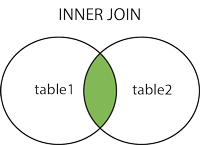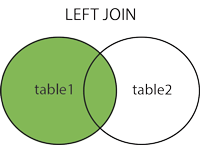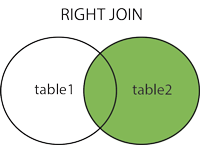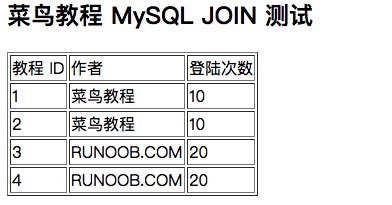MySQL 连接的使用
在前几章节中,我们已经学会了如何在一张表中读取数据,这是相对简单的,但是在真正的应用中经常需要从多个数据表中读取数据。
本章节我们将向大家介绍如何使用 MySQL 的 JOIN 在两个或多个表中查询数据。
你可以在 SELECT, UPDATE 和 DELETE 语句中使用 Mysql 的 JOIN 来联合多表查询。
JOIN 按照功能大致分为如下三类:
-
INNER JOIN(内连接,或等值连接):获取两个表中字段匹配关系的记录。
-
LEFT JOIN(左连接):获取左表所有记录,即使右表没有对应匹配的记录。
-
RIGHT JOIN(右连接): 与 LEFT JOIN 相反,用于获取右表所有记录,即使左表没有对应匹配的记录。
本章节使用的数据库结构及数据下载:runcodex-mysql-join-test.sql。
在命令提示符中使用 INNER JOIN
我们在RUNCODEX数据库中有两张表 tcount_tbl 和 runcodex_tbl。两张数据表数据如下:
实例
尝试以下实例:
测试实例数据
mysql> use RUNCODEX;
Database changed
mysql> SELECT * FROM tcount_tbl;
+---------------+--------------+
| runcodex_author | runcodex_count |
+---------------+--------------+
| 码农教程 | 10 |
| RUNCODEX.COM | 20 |
| Google | 22 |
+---------------+--------------+
3 rows in set (0.01 sec)
mysql> SELECT * from runcodex_tbl;
+-----------+---------------+---------------+-----------------+
| runcodex_id | runcodex_title | runcodex_author | submission_date |
+-----------+---------------+---------------+-----------------+
| 1 | 学习 PHP | 码农教程 | 2017-04-12 |
| 2 | 学习 MySQL | 码农教程 | 2017-04-12 |
| 3 | 学习 Java | RUNCODEX.COM | 2015-05-01 |
| 4 | 学习 Python | RUNCODEX.COM | 2016-03-06 |
| 5 | 学习 C | FK | 2017-04-05 |
+-----------+---------------+---------------+-----------------+
5 rows in set (0.01 sec)
接下来我们就使用MySQL的INNER JOIN(也可以省略 INNER 使用 JOIN,效果一样)来连接以上两张表来读取runcodex_tbl表中所有runcodex_author字段在tcount_tbl表对应的runcodex_count字段值:
INNER JOIN
mysql> SELECT a.runcodex_id, a.runcodex_author, b.runcodex_count FROM runcodex_tbl a INNER JOIN tcount_tbl b ON a.runcodex_author = b.runcodex_author;
+-------------+-----------------+----------------+
| a.runcodex_id | a.runcodex_author | b.runcodex_count |
+-------------+-----------------+----------------+
| 1 | 码农教程 | 10 |
| 2 | 码农教程 | 10 |
| 3 | RUNCODEX.COM | 20 |
| 4 | RUNCODEX.COM | 20 |
+-------------+-----------------+----------------+
4 rows in set (0.00 sec)
以上 SQL 语句等价于:
WHERE 子句
mysql> SELECT a.runcodex_id, a.runcodex_author, b.runcodex_count FROM runcodex_tbl a, tcount_tbl b WHERE a.runcodex_author = b.runcodex_author;
+-------------+-----------------+----------------+
| a.runcodex_id | a.runcodex_author | b.runcodex_count |
+-------------+-----------------+----------------+
| 1 | 码农教程 | 10 |
| 2 | 码农教程 | 10 |
| 3 | RUNCODEX.COM | 20 |
| 4 | RUNCODEX.COM | 20 |
+-------------+-----------------+----------------+
4 rows in set (0.01 sec)

MySQL LEFT JOIN
MySQL left join 与 join 有所不同。 MySQL LEFT JOIN 会读取左边数据表的全部数据,即便右边表无对应数据。
实例
尝试以下实例,以 runcodex_tbl 为左表,tcount_tbl 为右表,理解 MySQL LEFT JOIN 的应用:
LEFT JOIN
mysql> SELECT a.runcodex_id, a.runcodex_author, b.runcodex_count FROM runcodex_tbl a LEFT JOIN tcount_tbl b ON a.runcodex_author = b.runcodex_author;
+-------------+-----------------+----------------+
| a.runcodex_id | a.runcodex_author | b.runcodex_count |
+-------------+-----------------+----------------+
| 1 | 码农教程 | 10 |
| 2 | 码农教程 | 10 |
| 3 | RUNCODEX.COM | 20 |
| 4 | RUNCODEX.COM | 20 |
| 5 | FK | NULL |
+-------------+-----------------+----------------+
5 rows in set (0.01 sec)
以上实例中使用了 LEFT JOIN,该语句会读取左边的数据表 runcodex_tbl 的所有选取的字段数据,即便在右侧表 tcount_tbl中 没有对应的 runcodex_author 字段值。

MySQL RIGHT JOIN
MySQL RIGHT JOIN 会读取右边数据表的全部数据,即便左边边表无对应数据。
实例
尝试以下实例,以 runcodex_tbl 为左表,tcount_tbl 为右表,理解MySQL RIGHT JOIN的应用:
RIGHT JOIN
mysql> SELECT a.runcodex_id, a.runcodex_author, b.runcodex_count FROM runcodex_tbl a RIGHT JOIN tcount_tbl b ON a.runcodex_author = b.runcodex_author;
+-------------+-----------------+----------------+
| a.runcodex_id | a.runcodex_author | b.runcodex_count |
+-------------+-----------------+----------------+
| 1 | 码农教程 | 10 |
| 2 | 码农教程 | 10 |
| 3 | RUNCODEX.COM | 20 |
| 4 | RUNCODEX.COM | 20 |
| NULL | NULL | 22 |
+-------------+-----------------+----------------+
5 rows in set (0.01 sec)
以上实例中使用了 RIGHT JOIN,该语句会读取右边的数据表 tcount_tbl 的所有选取的字段数据,即便在左侧表 runcodex_tbl 中没有对应的runcodex_author 字段值。

在 PHP 脚本中使用 JOIN
PHP 中使用 mysqli_query() 函数来执行 SQL 语句,你可以使用以上的相同的 SQL 语句作为 mysqli_query() 函数的参数。
尝试如下实例:
MySQL ORDER BY 测试:
<?php
$dbhost = 'localhost';
$dbuser = 'root';
$dbpass = '123456';
$conn = mysqli_connect($dbhost, $dbuser, $dbpass);
if(! $conn )
{
die('连接失败: ' . mysqli_error($conn));
}
mysqli_query($conn , "set names utf8");
$sql = 'SELECT a.runcodex_id, a.runcodex_author, b.runcodex_count FROM runcodex_tbl a INNER JOIN tcount_tbl b ON a.runcodex_author = b.runcodex_author';
mysqli_select_db( $conn, 'RUNCODEX' );
$retval = mysqli_query( $conn, $sql );
if(! $retval )
{
die('无法读取数据: ' . mysqli_error($conn));
}
echo '<h2>码农教程 MySQL JOIN 测试<h2>';
echo '<table border="1"><tr><td>教程 ID</td><td>作者</td><td>登陆次数</td></tr>';
while($row = mysqli_fetch_array($retval, MYSQLI_ASSOC))
{
echo "<tr><td> {$row['runcodex_id']}</td> ".
"<td>{$row['runcodex_author']} </td> ".
"<td>{$row['runcodex_count']} </td> ".
"</tr>";
}
echo '</table>';
mysqli_close($conn);
?>
输出结果如下图所示:









点我分享笔记